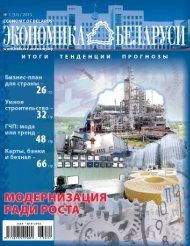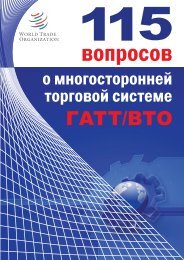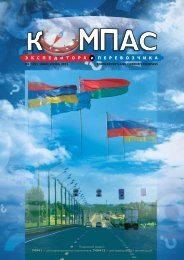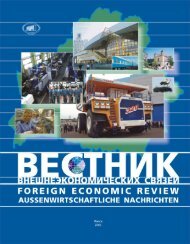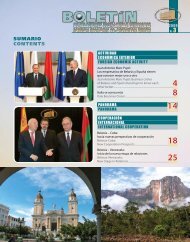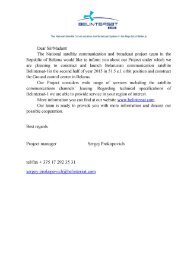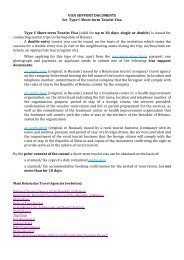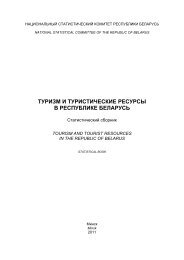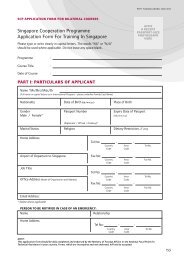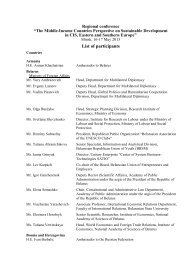Areas of globalinternational concernmeriting urgent attentioninclude trade, migration,climate change anddevelopment. Eacharea, along with itsgovernance, has beensignificantly altered bythe rise of the Southeradication of poverty and hunger in Africaand elsewhere in the developing world. Otherurgent issues such as climate change can be resolvedonly globally, and failing to act on themcollectively today will make them even moreacute and costly in the future.A new global view of public goodsThis changing world has profound implicationsfor the provision of public goods such as cleanair and other shared resources that the marketalone produces or allocates insufficiently or notat all and for which state mechanisms are essential.3 Desirable global public goods includea stable climate and a healthy global commons.They require rules for more stable financialmarkets, progress on trade reforms (such asthose involved in the Doha round of tradenegotiations) and mechanisms to finance andproduce green technologies.To that end, we need to rethink what is publicand what is private, what is best providedunilaterally and what multilaterally, and, importantly,when taking collective action, whatour respective responsibilities are. Public provisionof goods is important at the national andglobal levels, but coexistence of the public andthe private is inevitable (box 5.1). For example,in responding to climate change and the depletionof natural resources such as coal, oil andwater, governments have partnered with theprivate sector to invest in research and developmentfor alternative sources of energy.Areas of global international concern meritingurgent attention and cooperation includetrade, migration, climate change and development.Each area, along with its governance,has been significantly altered by the rise of theSouth. At the same time, the new position ofthe South presents opportunities for agreementand improved cooperation.TradeCountries throughout the South would benefitfrom the completion of the far-reachinginternational trade agreements envisioned bythe Doha development round of the WTO.However, the Doha round remains stalledwhile an increasingly complex web of bilateralBOX 5.1The shifting line between public and private in transportationWhether mass transportation is provided publicly or privately has an importantbearing on shared development goals of sustainability and affordableaccess. A society more concerned with equitable outcomes is more likely toprovide greater amounts of public transportation. Cost savings from economiesof scale are passed on to the public in the form of relatively cheapaccess to public transportation. In more egalitarian societies, low-earninggroups, including students, the elderly and the disabled, are likely to receivefurther discounts and subsidies. The idea is to reduce the excludability oftransportation services.Mass public transport can minimize the congestion and carbon emissionsfrom vehicles traditionally associated with private transportation.When a sizeable public transportation system already exists, it can be moreamenable to the quick introduction of greener technologies. For example,New Delhi mandates the use of compressed natural gas in public buses, amuch greener fuel than gasoline (the buses are run by both the public andthe private sectors).Environmentally conscious societies tend to incentivize the use of publicover private transport through congestion and carbon taxes on private vehicles,as in London, Milan and Singapore (and considered by San Francisco).Making public transportation affordable is not the only challenge. Becausemore-affluent people generally prefer private transport, the answer is tomake public transport less of an inferior good by ensuring safety, efficiencyand reliability.Public-private partnerships could be one way forward. They tend to resultin more efficient construction and operation of projects. The public partnersafeguards property rights, provides the regulatory framework and sometimesuses subsidies to meet the gap between private and social returns.Most railway projects in Latin America and the Caribbean have beenimplemented through public-private partnerships. India has one of the mostrapidly expanding public-private partnership programmes in transport; between1995 and 2006, about 230 public-private partnership projects costing$15.8 billion were implemented. China has extensively used the buildoperate-transfer model of public-private partnerships for toll roads and otherinfrastructure, especially since the 2000s.Spurred by increasing gas prices, private companies are likely to conductresearch on greener fuels and technologies on their own account. However,public funding and incentives are also required to ensure socially optimallevels of research into greener fuels and technologies. Indeed, green technologicalbreakthroughs are one of the most essential global public goodsand must remain in the public domain.Source: World Bank 2003, n.d.; Cheng, Hu and Zhao 2009.106 | HUMAN DEVELOPMENT REPORT <strong>2013</strong>
and regional trade arrangements has developed.These arrangements, involving fewer and sometimesmore-homogeneous players, can aligninterests and realize mutual gains for thoseengaged, without the deadlock encountered atthe multilateral level.Subregional trade and investment groups,such as the Economic Community of WestAfrica States and the Common Market ofthe South, have facilitated greater economicinteraction and policy cooperation in otherareas as well, from security to water resourcemanagement. These bilateral and regionalarrangements offer opportunities for furtherSouth–South economic integration andprovide a training ground for building competitivestrengths. 4Still, despite the benefits of bilateral and regionaltrade agreements, without better globaltrade rules and coordinating mechanisms thereare considerable efficiency costs. While encouragingfreer trade among members, tradingblocs tend to erect barriers to free trade witheach other, ultimately reducing global welfare. 5Other efficiency losses can result from theincreased market power that countries gain byconsolidating into trading blocs. 6 As researchfor this <strong>Report</strong> has shown, freer and fairer traderules can accelerate human development whencoupled with sustained public investment inhuman capabilities—including health, educationand other social services—and essentialinfrastructure—such as modern transportationand telecommunications links.Many aspects of a freer, nondiscriminatorytrade regime are best overseen by a stronger,reinvigorated set of multilateral agreements,but since regionalism may be here to stay, oneway forward is to gradually “multilateralize regionalism”.This would involve the WTO’s initiating“soft-law” ideas, such as the negotiationof voluntary best-practice guidelines for newregional trade agreements and modificationsof existing ones: the WTO could, for example,organize a hierarchy of guidelines for North–North, North–South and South–South regionaltrade agreements. 7MigrationIn 2010, at least 25 economies of the Southreported remittance inflows from migrantsexceeding 10% of GDP. Yet governance ofmigration is largely unilateral, by destinationcountries or bilateral. There are few mechanismsfor multilateral coordination. 8 Real humandevelopment concerns are at stake, mostimportantly, the rights of migrants. While remittancesprovide income for poor households,social upheaval and disruption also come withlarge-scale migration. Multilateral mechanismscould liberalize and simplify channels thatallow people to seek work abroad, ensure basicrights for migrants, reduce transaction costs associatedwith migration and improve outcomesfor migrants and destination communitiesalike. 9With the rise of the South, migration patternsare changing. Nearly half of remittancessent home to countries in the South come fromemigrant workers in other developing countries.In recent years, regional organizationsand economic integration processes have addedmigration to their agendas. These include theAssociation of Southeast Asian Nations, theAfrican Union, the Common Market of theSouth and the Southern African <strong>Development</strong>Community. 10 In 2012, the Global Forum onMigration and <strong>Development</strong> held discussionson South–South migration for the first time.While the governance of migration is notinevitably or exclusively a multilateral issue,international coordination mechanisms couldprovide a supporting framework for the emergingnetworks of regional and bilateral agreements.The beneficial impact of these dialoguescould be multiplied by global initiatives onmigration issues.With the continuing growth in annualinternational migration—from an estimated70 million four decades ago to more than200 million today, originating largely fromthe South—there is a growing need for rulesto protect the rights of migrants and provideagreed international norms for the flow of immigrantsbetween source and host countries. 11Such rules would benefit all parties, in botheconomic and social terms, while the costs ofinaction will continue to mount. These costsare not solely or even primarily financial: theyinclude the profound human costs of forciblyprolonged family separation, all-too-commonmistreatment in the workplace and the unnecessaryand indefensible degradation of humanWith the rise of theSouth, migration patternsare changing. Nearlyhalf of remittances senthome to countries inthe South come fromemigrant workers in otherdeveloping countriesChapter 5 Governance and partnerships for a new era | 107
- Page 1 and 2:
WNSEHuman DevelopmentReport 2013The
- Page 3 and 4:
Human Development Report 2013The Ri
- Page 5 and 6:
Human Development Report 2013 TeamD
- Page 7 and 8:
Finally, the Report also calls for
- Page 9 and 10:
Heather Simpson, Ben Slay, Mounir T
- Page 11 and 12:
3.6 India’s Supreme Court issues
- Page 13 and 14:
OverviewOne of the most heartening
- Page 15 and 16:
and sustainability are fully incorp
- Page 17 and 18:
Without investment in people, retur
- Page 19 and 20:
opportunity to reap the full benefi
- Page 21 and 22:
Woods institutions, the United Nati
- Page 23 and 24:
IntroductionWhen developed economie
- Page 25 and 26:
leading economies—Brazil, China a
- Page 27 and 28:
comparable access to information, e
- Page 29 and 30:
mobile phones: cellular banking is
- Page 32 and 33:
“The political problem ofmankind
- Page 34 and 35:
BOX 1.1Fairness, macroeconomics and
- Page 36 and 37:
BOX 1.3Amartya Sen, Nobel Laureate
- Page 38 and 39:
FIGURE 1.1Income per capita is risi
- Page 40 and 41:
BOX 1.4Subjective indicators of wel
- Page 42 and 43:
FIGURE 1.4There is notable variatio
- Page 44 and 45:
FIGURE 1.6Most regions show declini
- Page 46 and 47:
Progress in humandevelopment achiev
- Page 48 and 49:
BOX 1.7Social competencies: human d
- Page 50 and 51:
TABLE 1.3Inequality and satisfactio
- Page 52 and 53:
Not all countries havethe precondit
- Page 54 and 55:
“When the music changes,so does t
- Page 56 and 57:
BOX 2.1The South’s integration wi
- Page 58 and 59:
FIGURE 2.1As a share of world merch
- Page 60 and 61:
BOX 2.2Acquisitions by the South of
- Page 62 and 63:
FIGURE 2.3Between 2000 and 2010, In
- Page 64 and 65:
FIGURE 2.4Export earnings per capit
- Page 66 and 67:
BOX 2.6Final assembly is about more
- Page 68 and 69: Instead of having a centreof indust
- Page 70 and 71: FIGURE 2.6Emerging market economies
- Page 72 and 73: Developing countriestrade more amon
- Page 74 and 75: “We cannot expect thatall nations
- Page 76 and 77: TABLE 3.1Selected developing countr
- Page 78 and 79: A common featureof countries thatha
- Page 80 and 81: More important thangetting prices r
- Page 82 and 83: BOX 3.5Eastern Europe and Central A
- Page 84 and 85: States have to beconscious that the
- Page 86 and 87: As countries develop,they tend to d
- Page 88 and 89: Having weathered theAsian financial
- Page 90 and 91: Providing publicservices that contr
- Page 92 and 93: Advancing health requiresmore than
- Page 94 and 95: Universal public healthand educatio
- Page 96 and 97: • China. The Minimum Livelihood G
- Page 98 and 99: “Each generation will reap whatth
- Page 100 and 101: concerns will make for a complex en
- Page 102 and 103: A greater emphasison education cans
- Page 104 and 105: FIGURE 4.1Under the fast track scen
- Page 106 and 107: Around the worldpeople are calling
- Page 108 and 109: FIGURE 4.4Different environmental s
- Page 110 and 111: FIGURE 4.5Education policies can al
- Page 112 and 113: BOX 4.2China and Ghana: who benefit
- Page 114 and 115: FIGURE 4.8countries thus converge t
- Page 116 and 117: “Let us join hands to try tocreat
- Page 120 and 121: Addressing climatechange requires t
- Page 122 and 123: International governanceis increasi
- Page 124 and 125: BOX 5.2Jo Leinen, Member of the Eur
- Page 126 and 127: facilitates reserve investments and
- Page 128 and 129: Responsible sovereigntytakes the lo
- Page 130 and 131: FIGURE 5.1Under the accelerated pro
- Page 132 and 133: Good policymakingrequires greater f
- Page 134 and 135: A fair and less unequalworld requir
- Page 137 and 138: NotesOverview1 Atsmon and others 20
- Page 139 and 140: 25 Blinder 2006.26 UNIDO 2009.27 UN
- Page 141 and 142: which is 61.7 deaths per 1,000 live
- Page 143 and 144: ReferencesAbdurazakov, A., A. Minsa
- Page 145 and 146: urban_world_cities_and_the_rise_of_
- Page 147 and 148: Kamau, P., D. McCormick, and N. Pin
- Page 149 and 150: Labor Administration. Geneva: Inter
- Page 151 and 152: Human Development Report 2013The Ri
- Page 153 and 154: Statistical acknowledgementsThe Rep
- Page 155 and 156: Key to HDI countries and ranks, 201
- Page 157 and 158: Human Development Report 2013The Ri
- Page 159 and 160: Human Development Report 2013The Ri
- Page 161 and 162: Human Development Report 2013The Ri
- Page 163 and 164: Human Development Report 2013The Ri
- Page 165 and 166: Human Development Report 2013The Ri
- Page 167 and 168: Human Development Report 2013The Ri
- Page 169 and 170:
Human Development Report 2013The Ri
- Page 171 and 172:
Human Development Report 2013The Ri
- Page 173 and 174:
Human Development Report 2013The Ri
- Page 175 and 176:
Human Development Report 2013The Ri
- Page 177 and 178:
Human Development Report 2013The Ri
- Page 179 and 180:
Human Development Report 2013The Ri
- Page 181 and 182:
Human Development Report 2013The Ri
- Page 183 and 184:
Human Development Report 2013The Ri
- Page 185 and 186:
Human Development Report 2013The Ri
- Page 187 and 188:
Human Development Report 2013The Ri
- Page 189 and 190:
Human Development Report 2013The Ri
- Page 191 and 192:
Human Development Report 2013The Ri
- Page 193 and 194:
Human Development Report 2013The Ri
- Page 195 and 196:
Human Development Report 2013The Ri
- Page 197 and 198:
Human Development Report 2013The Ri
- Page 199 and 200:
Human Development Report 2013The Ri
- Page 201 and 202:
Human Development Report 2013The Ri
- Page 203 and 204:
Human Development Report 2013The Ri
- Page 205 and 206:
Human Development Report 2013The Ri
- Page 207 and 208:
Human Development Report 2013The Ri
- Page 209 and 210:
Human Development Report 2013The Ri
- Page 211 and 212:
Statistical referencesADB (Asian De
- Page 213 and 214:
Core features of the model pertinen
- Page 215 and 216:
Countries and HDI ranks in 2012 and



